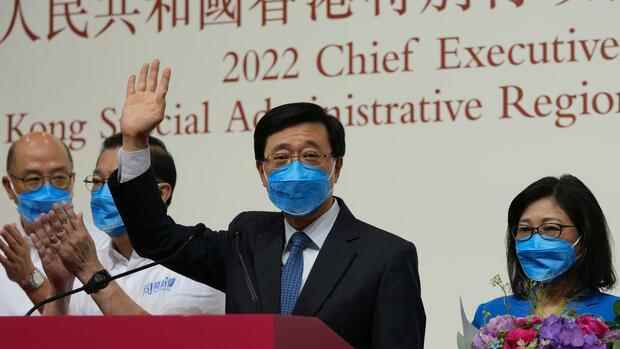Lee’s choice was considered safe.
(Photo: AP)
Beijing “Today is an important day,” said John Lee in his speech after announcing the verdict that made him Hong Kong’s new head of government. “Not only is it an election day, it’s also Mother’s Day… and also World Smile Day… We can all smile on this historic day.” Effective July 1, Hong Kong has a new head of government. And most Hong Kong residents don’t feel like smiling.
More than 99 percent of the approximately 1,500 members of an election committee selected by the Beijing government voted on Sunday for the central government’s approved – and only – candidate Lee, who will replace the controversial head of government Carrie Lam from July 1st. Lam had decided not to run again.
The 64-year-old is considered a political hardliner and was previously Minister of Security and most recently Chief Secretary of the Hong Kong government. Lee is anything but popular with the general public. In a survey by the Hong Kong Public Opinion Research Institute, citizens recently showed great dissatisfaction with his work as chief secretary of the government – his values were roughly on the same level as those of the previous head of government Carrie Lam, who was very unpopular with the population.
But Lee had been appointed as a candidate by the Chinese central government in Beijing. Since the election for Hong Kong’s head of government is not democratic, but by electors loyal to Beijing, his appointment was considered certain despite poor popularity ratings. The EU criticized the electoral process. It is a “violation of democratic principles and political pluralism” and a further step towards the abolition of the “one country, two systems” principle.
Top jobs of the day
Find the best jobs now and
be notified by email.
Lee takes over Hong Kong in an economically desolate state
Under Lee’s leadership, pro-democracy protests in Hong Kong were brutally cracked down, particularly in 2019. International government officials and human rights organizations around the world have criticized the massive use of tear gas, rubber bullets and live ammunition against the demonstrators, who had taken to the streets in Hong Kong for months for more democracy.
Lee also helped pass the draconian National Security Law, which has been in effect in the metropolis since 2020. The law, which can be interpreted broadly, allows for the arrest and sentencing of critics of the Hong Kong or Beijing government on the slightest occasion. A report by the human rights organization Amnesty International concluded last year that the National Security Act is being used to target dissenters and “justify censorship, harassment, arrests and prosecutions that violate human rights.” Since the law came into force, more than 180 people have been arrested and numerous media houses have had to close.
The Chinese Special Administrative Region – which was once considered the most liberal metropolis in all of Asia – has gone through a profound change in recent years thanks to the law. Although the metropolis in southern China was promised a high degree of autonomy when the British crown colony was returned to Beijing, the central government on the Chinese mainland has massively tightened its grip on Hong Kong over the past two years. Freedom of expression and freedom of the press in the once liberal city has reached a low point. Numerous international companies have already withdrawn their employees or relocated offices.
Lee takes over Hong Kong in an economically desolate state. The brutal crackdown on the protests and the outbreak of the corona virus had hit the economy hard. The growth of the financial metropolis fell by four percent in the first quarter compared to the same period last year. Lee promised that he wants to revitalize the economy. But he has no experience with it. He has spent his entire professional career with the Hong Kong Police Force.
More: The World After: How the Ukraine War Redistributed Power and Wealth
